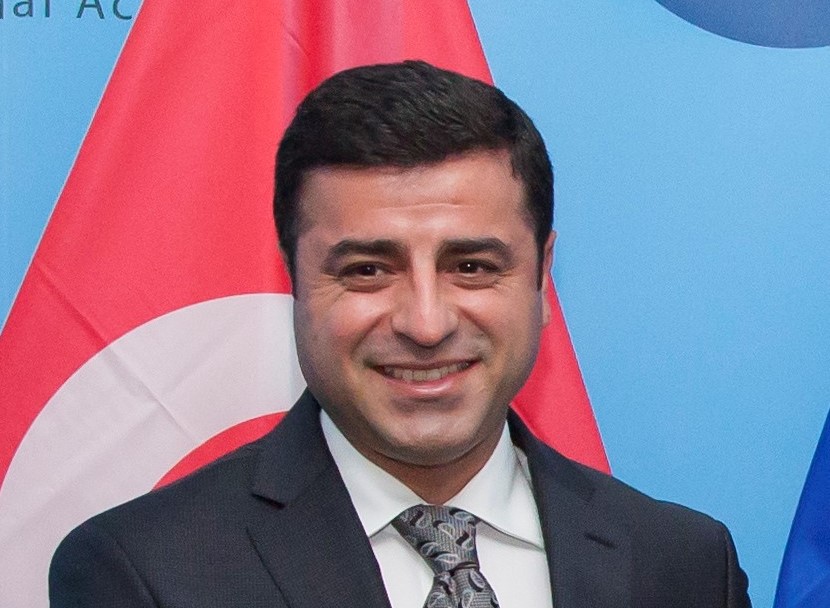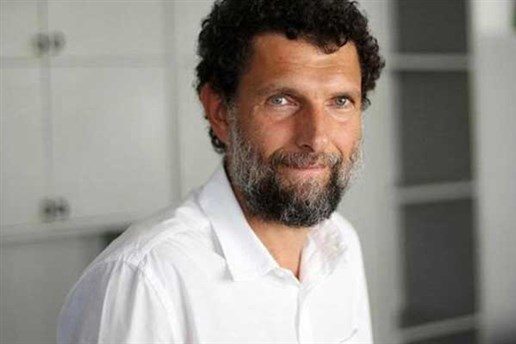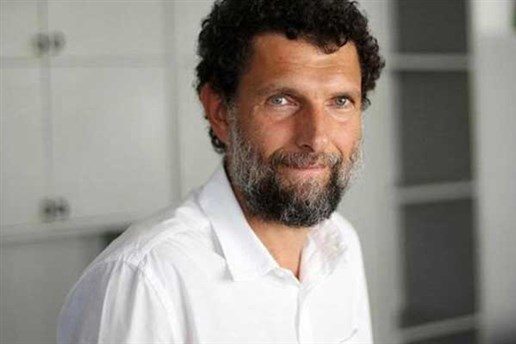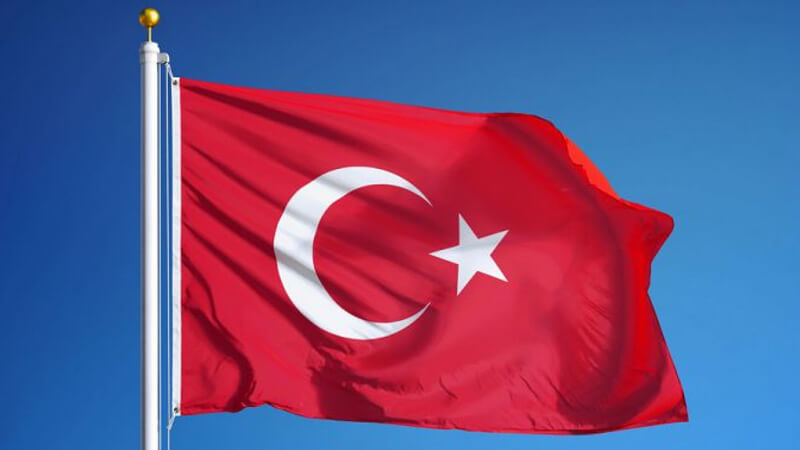
Mar 4, 2021 | Advocacy, Non-legal submissions
The Council of Europe Committee of Ministers should direct Turkey to release the Kurdish opposition politician Selahattin Demirtaş in compliance with a European Court of Human Rights judgment, five human rights groups said today.
The five are ARTICLE 19, Human Rights Watch, the International Commission of Jurists, the International Federation for Human Rights, and the Turkey Human Rights Litigation Support Project.
The groups have made a detailed joint submission to the Council of Europe’s Committee of Ministers, which oversees enforcement of the European Court of Human Rights (ECtHR) judgments, asking it to issue the decision at its meeting on March 9-11, 2021. The groups said that Turkey continues to violate Demirtaş’s rights by flouting a landmark judgment issued by the court on December 22, 2020, requiring his immediate release.
“President Erdogan and senior Turkish officials have responded to the European Court’s judgment ordering Demirtaş’s release with false arguments that it does not apply to his current detention and that the court’s rulings are not binding on Turkey,” said Aisling Reidy, senior legal adviser at Human Rights Watch. “The Committee of Ministers should call on Turkey to release Demirtaş immediately and leave no doubt that disregarding or attempting to bypass judgments of the Strasbourg court is unacceptable.”
Selahattin Demirtaş, former co-chair of the Peoples’ Democratic Party (HDP), a pro-Kurdish rights opposition party to the government of President Recep Tayyip Erdoğan, has been held in Edirne F-Type prison in western Turkey since November 4, 2016.
The Grand Chamber of the European Court of Human Rights ruled that in initially detaining Demirtaş and then prolonging his detention for over four years, the Turkish government pursued an ulterior purpose of preventing him from carrying out his political activities, depriving voters of their elected representative, and “stifling pluralism and limiting freedom of political debate: the very core of the concept of a democratic society.”
Ordering Demirtaş’s immediate release, the court found that Turkey had violated rights protected by Articles 5.1 and 5.3 (right to liberty) of the European Convention on Human Rights, Article 10 (right to freedom of expression), Article 3 Protocol 1 (the right to free and fair elections), and Article 18 (misuse of limitations on rights in the Convention), by pursuing Demirtaş’s detention for political ends.
In finding the government acted in bad faith (Article 18 violation), the court notably refers to Demirtaş’s current detention, from September 20, 2019 which relates to an investigation into deadly protests in southeast Turkey on October 6-8, 2014. The Strasbourg court said what Turkey was attempting to do was “a new legal classification” of the same facts, because the same “acts and incidents” had formed the basis on which Demirtaş had been detained up until September 2, 2019, and for which he is already on trial.
Finding a continuity between Demirtaş’s pretrial detention from November 4, 2016, to September 2, 2019, and again from September 20, 2019, to the present, the court termed the September 20 order a “return to pre-trial detention.” The Turkish government has rejected this finding and contends that Demirtaş is currently detained in the context of a case not covered by the European Court judgment.
“As the European Court of Human Rights made clear, Demirtaş’s detention on September 20, 2019, was in fact not a separate detention but a ‘return to pre-trial detention’ and a continuing violation of his Convention rights,” said Róisín Pillay, Europe and Central Asia Director of the International Commission of Jurists. “The Committee of Ministers should press Turkey to immediately end this abuse of judicial proceedings aimed at harassing an opposition politician.”
The groups’ submission provides a full analysis of political and legal developments since the issuing of the ECtHR Grand Chamber judgment – including a new indictment against Demirtaş – and repeated statements from Turkey’s president and senior officials that the Demirtaş judgment and European Court judgments in general are not binding on Turkey.
“Charging such a prominent political figure with 30 serious ‘new’ offences based on political speeches mostly 6 years ago, which the Court already found to be protected, is pure repackaging – a thinly veiled attempt to circumvent compliance with the Court’s judgment requiring immediate release,” said Helen Duffy of the TLSP. “The Grand Chamber already rejected earlier ‘reclassification’ attempts, and it is time for a robust response by the Committee of Ministers to break the cycle of evasion.”
The groups urged the Committee of Ministers to place Demirtaş’s case under their enhanced procedures, treating it as a lead case, and to indicate that continued refusal to carry out the judgment may lead them to refer Turkey to the European Court for non-compliance. The groups urged the Committee of Ministers to call on the Turkish government to:
- Immediately release Demirtaş as required by the ECtHR judgment, and make clear that the judgment applies to his ongoing detention and to any future charges or detentions in which the factual or legal basis is substantially similar to that which the ECtHR has already addressed in its judgment;
- Halt all criminal proceedings initiated against Demirtaş following the constitutional amendment lifting his immunity, which was deemed unlawful by the ECtHR’s Grand Chamber;
- End the abuse of judicial proceedings to harass Demirtaş, stifle pluralism, and limit freedom of political debate, emphasizing that this cessation is essential to the restoration of Demirtaş’s rights;
- End interference in Demirtaş’s cases, especially by attempting to pressure or unduly influence judicial authorities; and
- Publicly correct false claims promoted by senior Turkish government officials that the Grand Chamber judgment in the Demirtaş case and European Court judgments more generally, are not binding.
Find the intervention here: Turkey-Demirtas_v_TurkeyExecution-JointSubmission-2021-ENG
Türkiye: AİHM Kararı Sonrasında Siyasetçi Serbest Bırakılsın
Avrupa Konseyi Bakanlar Komitesi, Türkiye’den Demirtaş Kararının Uygulanmasını Talep Etmelidir
(İstanbul, 4 Mart 2021) — Beş ayrı insan hakları örgütü bugün yaptıkları açıklamada, Avrupa Konseyi Bakanlar Komitesi’nin, Türkiye’yi Avrupa İnsan Hakları Mahkemesi kararına uyarak muhalif Kürt siyasetçi Selahattin Demirtaş’ı serbest bırakmaya yönlendirmesi gerektiğini belirtti. Bu beş insan hakları örgütü ARTICLE 19, İnsan Hakları İzleme Örgütü, Uluslararası Hukukçular Komisyonu, Uluslararası İnsan Hakları Federasyonu ve Türkiye İnsan Hakları Davalarına Destek Projesi’nden oluşuyor.Hak örgütleri, Avrupa İnsan Hakları Mahkemesi (AİHM) kararlarının uygulanmasının denetiminden sorumlu Avrupa Konseyi Bakanlar Komitesi’ne detaylı bir ortak bildirimde bulunarak, Komitenin 9-11 Mart 2021 tarihli toplantısında bu konuda karar almasını talep ettiler. Örgütler, Türkiye’nin AİHM’in 22 Aralık 2020 tarihli Demirtaş’ın serbest bırakılmasını gerektiren önemli kararını görmezden gelerek Demirtaş’ın haklarını ihlal etmeye devam ettiğini ifade ettiler.
İnsan Hakları İzleme Örgütü Kıdemli Hukuk Danışmanı Aisling Reidy, “Cumhurbaşkanı Erdoğan ve üst düzey yetkililer, Demirtaş’ın serbest bırakılmasını öngören AİHM kararına, kararın mevcut tutukluluğa uygulanmadığı ve Mahkemenin kararlarının Türkiye için bağlayıcı olmadığı yönündeki yanlış argümanlarla cevap verdiler” dedi. Reidy, “Bakanlar Komitesi, Türkiye’yi Demirtaş’ı derhal serbest bırakmaya çağırmalı, AİHM kararlarını görmezden gelmenin veya etrafından dolanmaya çalışmanın kabul edilemez olduğuna dair şüpheye yer bırakmamalıdır” dedi.
Cumhurbaşkanı Recep Tayyip Erdoğan’ın hükümetine muhalif Kürtlerin haklarını destekleyen politik çizgideki Halkların Demokratik Partisi (HDP) eski eş başkanı Demirtaş, 4 Kasım 2016’dan bu yana Türkiye’nin batısındaki Edirne F Tipi Cezaevi’nde tutuluyor.
AİHM Büyük Dairesi, kararında “Türkiye hükümetinin, Demirtaş’ı tutuklayıp, tutukluluğunu 4 yıldan fazla sürdürerek onun siyasi faaliyetlerini engellemek, seçmenleri seçilmiş temsilcilerinden mahrum bırakmak, demokratik bir toplumun temeli olan çoğulculuğu ve siyasi tartışmayı kısıtlamak yönünde örtülü amaçlar taşıdığı” ifadelerine yer verdi.
Demirtaş’ın derhal serbest bırakılması gerektiğine karar veren Mahkeme, Türkiye’nin Avrupa İnsan Hakları Sözleşmesi’nin 5/1 ve 5/3. maddeleri (özgürlük hakkı), 10. madde (ifade özgürlüğü hakkı), 1. Ek Protokol 3. madde (serbest seçim hakkı) ve 18. madde (haklara getirilecek kısıtlanmaların sınırlanması) ile korunan hakları ihlal ettiğini tespit etti.
Mahkeme, hükümetin hakların kısıtlanmasında kötü niyetle hareket ettiğini tespit ederken (madde 18 ihlali), 6-8 Ekim 2014’te Türkiye’nin güneydoğusunda ölümlerin yaşandığı protestolara ilişkin bir soruşturma kapsamında Demirtaş’ın 20 Eylül 2019’dan bu yana tutuklu olduğunun altını çizdi. AİHM, Türkiye’nin bu soruşturmada yapmaya çalıştığı şeyin aynı olguların “yeni bir hukuki vasıflandırması” olduğunu, çünkü aynı “eylemler ve olayların” Demirtaş’ın 2 Eylül 2019’a kadar sürdürülen tutukluluğuna ve hakkında o süreçle bağlantılı olarak devam eden yargılamaya esas alındığını belirtti.
Demirtaş’ın 4 Kasım 2016’dan 2 Eylül 2019’a kadarki tutukluluğu ile 20 Eylül 2019’dan bu yana devam eden tutukluluğu arasında bir süreklilik tespit eden Mahkeme, 20 Eylül tarihli kararı “tutukluluğa geri döndürme” olarak tanımladı. Türkiye Hükümeti ise bu tespiti reddetti ve Demirtaş’ın şu an AİHM kararı kapsamında olmayan bir dava dolayısıyla tutuklu olduğunu iddia ediyor.
Uluslararası Hukukçular Komisyonu Avrupa ve Orta Asya Direktörü Róisín Pillay, “Avrupa İnsan Hakları Mahkemesi’nin açıkça belirttiği gibi, Demirtaş’ın 20 Eylül 2019’da tutuklanması aslında ayrı bir tutuklama değil, ‘tutukluluğa geri döndürmedir’ ve Sözleşme’de yer alan haklarının ihlalinin sürdürülmesidir” dedi. Pillay, “Bakanlar Komitesi, muhalif bir siyasetçiyi taciz etmek amacıyla adli işlemlerin kötüye kullanılmasına derhal son vermesi için Türkiye’ye baskı yapmalıdır” dedi.
Hak örgütlerinin bildirimi, Demirtaş aleyhindeki yeni iddianame, Türkiye’nin Cumhurbaşkanı ve üst düzey yetkililerinin Demirtaş kararının ve genel olarak AİHM kararlarının bağlayıcı olmadığına ilişkin tekrar eden açıklamaları da dahil olmak üzere AİHM Büyük Dairesinin kararı sonrasında gerçekleşen siyasi ve hukuki gelişmelere ilişkin kapsamlı bir analiz sunuyor.
Türkiye İnsan Hakları Davalarına Destek Projesi’nden Helen Duffy, “bu kadar önemli bir siyasi figürü, Mahkemenin koruma kapsamında olduğunu tespit ettiği ve çoğunlukla 6 yıl önceki siyasi açıklamalarına dayanan 30 “yeni” ve ciddi suçla itham etmek, Mahkemenin derhal serbest bırakma kararına uymaktan kaçınma girişiminin bir tekrarıdır.” dedi. Duffy, “Büyük Daire daha önceki ‘yeniden vasıflandırma’ girişimlerini reddetmiştir, Bakanlar Komitesinin kararı uygulamaktan kaçınma döngüsünü kırmak için buna güçlü bir yanıt vermesinin zamanı gelmiştir.” dedi.
Hak örgütleri, Bakanlar Komitesini Demirtaş’ın davasını nitelikli denetim prosedürü altında izlenmek üzere sınıflandırmaya ve öncü dava olarak kabul etmeye, Türkiye’nin kararın uygulanmasını reddetmeye devam etmesinin, bu nedenle AİHM’e yönlendirilmesine yol açabileceğini dile getirmeye davet ettiler. Örgütler, Bakanlar Komitesinin Türkiye hükümetine yönelik şu çağrılarda bulunmasını talep ettiler:
- AİHM kararının gereği olarak Selahattin Demirtaş’ın derhal serbest bırakılması için çağrıda bulunulmalı, Büyük Daire kararının Demirtaş’ın devam eden tutukluluğunu da kapsadığı, kararın AİHM tarafından da değinildiği gibi olgusal ya da yasal dayanakları ciddi ölçüde benzer olan, gelecekte ileri sürülebilecek suçlamaları veya yapılabilecek tutuklamaları da kapsayacağı vurgulanmalıdır.
- AİHM Büyük Daire tarafından hukuka aykırı bulunduğu üzere, Demirtaş’ın dokunulmazlığını kaldıran Anayasa değişikliğinden sonra kendisine yöneltilen tüm ceza yargılamalarının durdurulması konusunda çağrıda bulunulmalıdır.
- Demirtaş’ın yargı yollarının kötüye kullanılması yolu ile taciz edilmesini durdurmaya, çoğulculuğun bastırılması ve siyasi tartışma özgürlüğünü sınırlanmasına son vermeye ve bunun Demirtaş’ın haklarının iadesi için önemli olduğunu vurgulamaya çağrılmalıdır.
- Yargı makamlarına baskı yapmaya veya onları hukuka aykırı bir şekilde etkilemeye çalışarak Demirtaş’ın davalarına doğrudan müdahale etmeye son vermeye çağrılmalıdır.
- Üst düzey yetkililer tarafından savunulan Demirtaş davasındaki Büyük Daire kararının ve daha genel olarak AİHM kararlarının bağlayıcı olmadığı yönündeki yanlış iddiaları kamuya açık bir şekilde düzeltmeye çağırılmalıdır.
Find the submission in Turksish: Turkey-Demirtas_v_TurkeyExecution-JointSubmission-2021-TUR

Nov 3, 2020 | Advocacy, Non-legal submissions
Today, the ICJ, jointly with Human Rights Watch and the Turkey Human Rights Litigation Support Project presented a submission to the Council of Europe’s Committee of Ministers on the Execution of the judgment Kavala v. Turkey by the European Court of Human Rights.
The ICJ, Human Rights Watch and the Turkey Human Rights Litigation Support Project have reported to the Committee of Ministers that new charges against Osman Kavala lack concrete evidence and have been brought in disregard of the ECtHR’s judgment whose execution the Committee is supervising.
The three NGOs have invited the Committee of Ministers to:
- consider adopting the relevant recommendations formulated in their submission of 29 May 2020;
- take further steps to end immediately Mr. Kavala’s ongoing detention, which has now exceeded three years;
- recognise at its 1390th 1-3 December 2020 meeting that the continuing detention of Osman Kavala violates Article 46 of the Convention concerning the binding nature of final judgments of the ECtHR and may trigger Article 46(4) infringement proceedings against Turkey; and
- take the necessary general measures identified in the NGOs submission of 29 May 2020 to implement the ECtHR’s ruling concerning Article 5 and 18 of the Convention in Kavala v. Turkey and its findings in relation to human rights defenders.
In their initial submission dated 29 May 2020, the NGOs underlined that decisions taken to prolong Mr. Kavala’s detention had been guided by political expediency and there had been a concerted political effort by the Turkish authorities to prevent Mr. Kavala’s release. These bases for their action are evident in the sequence of court orders prolonging Mr. Kavala’s detention, the actions of the executive and prosecutors in relation to the judicial procedures against him, and the lack of due consideration of the ECtHR’s findings and objective deliberation as to the legality of any deprivation of liberty. The NGOs made several recommendations to the Committee of Ministers, on the issues of the general and individual measures, to ensure full implementation of the ECtHR’s judgment and Mr. Kavala’s immediate release on the ground that the Court’s judgment clearly applies to his ongoing detention.
In its judgment on Kavala v. Turkey, the EUropean Court of Human Rights, on 10 December 2019, found violations of Article 5(1) (right to liberty and security), Article 5(4) (right to a speedy decision on the lawfulness of detention) and Article 18 (limitation on use of restrictions on rights) of the European Convention on Human Rights taken together with Article 5(1). The Court required the Government of Turkey to take measures to end the detention of human rights defender Osman Kavala and to secure his immediate release. The Court stated that any continuation of Mr. Kavala’s detention would prolong the violations and breach the obligation to abide by the Court’s judgment in accordance with Article 46(1) of the Convention. The judgment became final on 11 May 2020.
Despite the Court’s clear findings and mandatory order, Mr. Kavala remains in detention as of the date of this submission.
Turkey-Kavala_v_TurkeyExecution-JointSubmission2-HRWICJTHRLP-2020-ENG

Jun 3, 2020 | Advocacy, Cases, Legal submissions
The Council of Europe Committee of Ministers should issue a decision at its 4 June 2020 meeting directing Turkey to release the human rights defender Osman Kavala and drop all charges against him, the ICJ, Human Rights Watch and the Turkish Human Rights Litigation Support Project said today.
The three groups have submitted a detailed submission to the Committee of Ministers of the Council of Europe, which oversees enforcement of European Court of Human Rights judgments. The groups outlined how Turkey continues to violate Kavala’s rights by flouting a landmark judgment, that became final on May 11 requiring his immediate release.
“The European Court ruled that Kavala’s detention is unlawful, and their binding judgment requires Turkey to release him immediately,” said Emma Sinclair-Webb, Turkey director at Human Rights Watch. “The Committee of Ministers, at its June 4 meeting, should press Turkey to comply and issue a clear message that no Council of Europe member state should be silencing human rights defenders.”
The judgment is particularly significant because it is the first final ruling against Turkey in which the court determined that in interfering with an individual’s rights Turkey acted in bad faith and out of political motivations, violating Article 18 of the European Convention on Human Rights. The court said that by detaining Kavala since November 2017 and prosecuting him, the Turkish authorities had “pursued an ulterior purpose, namely to silence him as human rights defender.”
The European Court judgment in Kavala v. Turkey (Application no. 28749/18) found violations of Article 5(1) (right to liberty and security), Article 5(4) (right to a speedy decision on the lawfulness of detention), and the rarely used Article 18 (limitation on use of restrictions on rights) taken together with Article 5(1). It required Turkey to release Kavala and said that any continuation of his detention would prolong the violations and breach the obligation to abide by the judgment in accordance with Article 46(1) of the European Convention on Human Rights..
A court ordered Kavala’s detention on November 1, 2017 on bogus allegations that he used the 2013 Istanbul Gezi Park protests as a pretext for an attempted coup, and that he was involved in the July 15, 2016 attempted military coup. On February 18, 2020, Kavala and his eight co-defendants were acquitted on charges of “attempting to overthrow the government by force and violence” in the Gezi Park trial .
But Kavala was not released, and a court detained him again immediately on the charge of “attempting to overthrow the constitution by force and violence” because of an ongoing 2016 coup-related investigation against him. Turkey’s President Recep Tayyip Erdoğan had publicly criticized his acquittal just before he was detained again. Weeks later a court ordered his detention a second time on another charge (“espionage”) but relying on the same evidence and investigation file.
“The sequence of court orders prolonging his detention and the lack of objective deliberation as to the lawfulness of any deprivation of liberty indicates that decisions have been guided by political considerations and there has been a concerted official effort to prevent Kavala’s release,” said Róisín Pillay, Director of ICJ’s Europe and Central Asia Programme . “Since the European Court’s judgment, Turkey has continued to violate Kavala’s human rights.”
The targeted harassment in Turkey of rights defenders is part of a wider trend of arbitrary detentions and abusive prosecutions of journalists, elected politicians, lawyers, and other perceived government critics. This trend has been well-documented in many reports by the Council of Europe, the European Union, and human rights organizations.
“The campaign of persecution against Osman Kavala and the failure to release him and drop all charges have perpetuated a chilling environment for all human rights defenders in Turkey,” said Ayşe Bingöl Demir, Co-Director of the Turkish Human Rights Litigation Support Project.
The three organizations made detailed recommendations to the Committee of Ministers, urging it to:
- Call on the government of Turkey to ensure the immediate release of Osman Kavala as required by the European Court’s judgment, stressing that the judgment clearly applies to his ongoing detention and persecution;
- Place the Kavala v. Turkey judgment under “enhanced procedures” and treat it as a leading case under Article 18 of the European Convention;
- Recognize that Kavala’s continuing detention violates Article 46 of the convention, concerning the binding nature of final judgments of the European Court, and that a failure to release Kavala may trigger an Article 46(4) procedure (infringement proceedings);
- Emphasize to the Government of Turkey that Kavala’s release is of added urgency in the context of the Covid-19 pandemic, which increases the risk to his health in detention;
- Ask the Government of Turkey to drop all charges under which Kavala has been investigated and detained to silence him, in conformity with the court’s findings that his rights have been violated and that his exercise of rights to freedom of expression, assembly and association was wrongfully used as evidence to incriminate him.
The groups also identified the general measures that Turkey needs to take to carry out the judgment to end politically motivated detention and prosecution of human rights defenders and other perceived government critics. These measures focus on Turkey’s structural rule of law problems. They include executive control over Turkey’s judiciary and prosecutorial authorities, and the evidence of a clear pattern of direct political interference in court decisions through frequent public speeches by Turkey’s president and proxies. A pattern of criminalizing the exercise of convention-protected rights defines many of the cases against human rights defenders and other perceived government critics.
Turkey’s international partners, including the European Union, should make it clear that the full implementation of the court’s judgment in Osman Kavala’s case will be key in measuring the credibility of any government pledges for reform, the three groups said. Any justice reform and any human rights action plan would remain hollow until the reasons that unjustly led Kavala to prison are addressed and fixed.
Kavala_v_Turkey-Execution-JointSubmissionR9_2-ICJHRWTLP-LegalSubmission-2020-eng (downaload the submission)
Kavala_v_Turkey-Execution-JointSubmissionR9_2-ICJHRWTLP-LegalSubmission-2020-tur (download the submission in Turkish)
Türkiye: AİHM Kararı Sonrası Hak Savunucusu Serbest Bırakılsın
Avrupa Konseyi Bakanları Osman Kavala’nın tahliyesinde ısrar etmelidir
(Strazburg, 3 Haziran 2020) – İnsan Hakları İzleme Örgütü, Uluslararası Hukukçular Komisyonu ve Türkiye İnsan Hakları Davalarına Destek Projesi, Avrupa Konseyi Bakanlar Komitesinin 4 Haziran 2020 tarihli toplantısında Türkiye’yi insan hakları savunucusu Osman Kavala’nın serbest bırakılmasına ve ona yönelik tüm suçlamaların düşürülmesine yöneltecek bir karar alması gerektiğini belirttiler.
Bu üç grup, Avrupa İnsan Hakları Mahkemesi kararlarının uygulanmasını denetleyen Avrupa Konseyi Bakanlar Komitesi’ne detaylı bir bildirim sundu. Gruplar, Türkiye’nin 11 Mayıs’ta kesinleşen ve Kavala’nın derhal tahliye edilmesini gerektiren bu önemli kararı göz ardı ederek, Kavala’nın haklarını ihlal etmeye devam ettiğini belirtti.
İnsan Hakları İzleme Örgütü Türkiye Direktörü Emma Sinclair-Webb, “Avrupa Mahkemesi, Kavala’nın alıkonmasının hukuka aykırı olduğuna ve bağlayıcı kararının gereği olarak Türkiye’nin Kavala’yı derhal tahliye etmesi gerektiğine karar verdi” dedi. Emma Sinclair-Webb, “Bakanlar Komitesi, 4 Haziran toplantısında, hiçbir Avrupa Konseyi üyesi devletin insan hakları savunucularını susturmaması gerektiğine dair net bir mesaj vererek buna uyması için Türkiye’ye baskı yapmalıdır” dedi.
Bu karar, Türkiye’nin kötü niyetle ve siyasi amaçlarla bir bireyin haklarına müdahale ettiğini ve Avrupa İnsan Hakları Sözleşmesi’nin 18. maddesini ihlal ettiğini tespit eden Türkiye aleyhindeki ilk nihai karar olduğundan özel bir önem taşımakta. AİHM, Osman Kavala’yı Kasım 2017’den bu yana alıkoyup yargılayan Türk makamlarının “başvuranın bir insan hakları savunucusu olarak susturulmasını sağlamak için örtülü bir amaç taşıdığını” tespit etmişti.
Avrupa Mahkemesi, Kavala/Türkiye kararında (Başvuru no. 28749/18), madde 5/1 (özgürlük ve güvenlik hakkı), madde 5/4 (alıkonmanın yasaya uygunluğuna ilişkin ivedi karar alma hakkı) ve nadiren kullanılan madde 18 (haklara getirilecek kısıtlamaların sınırlanması) ile birlikte madde 5/1’in ihlal edildiğine karar vermiştir. Karar, Türkiye’nin Kavala’yı tahliye etmesini zorunlu kılmış, tutukluluğunun devam etmesinin ihlalleri devam ettireceğini ve Sözleşmenin 46(1) maddesi uyarınca AİHM kararlarına uyma yükümlülüğünü ihlal edeceğini belirtmiştir.
Bir hakimlik 2013 İstanbul Gezi Parkı protestolarını darbe girişimine bahane olarak kullandığı ve 15 Temmuz 2016 askeri darbe girişimine müdahil olduğu iddiasıyla, Kavala’nın 1 Kasım 2017’de tutuklanmasına karar vermiştir. 18 Şubat 2020’de Kavala ve diğer sekiz sanık, Gezi Parkı davasında “cebir ve şiddet kullanarak hükümeti ortadan kaldırmaya teşebbüs” suçlamasından beraat etmiştir.
Ancak Kavala cezaevinden tahliye edilmemiş ve bir hâkim kararıyla 2016 darbesiyle ilgili devam eden bir soruşturmayla ilişkili olarak “anayasal düzeni cebir, şiddet kullanarak ortadan kaldırmaya teşebbüs” suçlamasıyla tekrar tutuklanmıştır. Tekrar tutuklanmasından kısa bir süre önce Cumhurbaşkanı Recep Tayyip Erdoğan halka açık şekilde Kavala’nın beraatini eleştirmiştir. Kavala haftalar sonra, aynı delillere ve soruşturma dosyasına dayanan bir başka suçlama ile (casusluk) bir kez daha tutuklanmıştır.
Uluslararası Hukukçular Komisyonu Avrupa ve Orta Asya Programı Direktörü, Róisín Pillay, “Tutukluluğun devamına ilişkin yargı kararlarının silsilesi ve tutuklamanın yasallığı konusunda nesnel bir değerlendirmenin olmaması, kararların siyasi beklentiler tarafından yönlendirildiğini ve Kavala’nın tahliyesini önlemek için düzenlenmiş bir siyasi çaba olduğunu göstermektedir.” dedi. Pillay, “Avrupa Mahkemesi’nin kararından bu yana Türkiye, Kavala’nın insan haklarını ihlal etmeye devam etti” tespitinde bulundu.
Türkiye’de insan hakları savunucularına yönelik taciz daha genel olarak gazetecilere, seçilmiş siyasetçilere, hukukçulara, hükümeti eleştirdiği düşünülenlere yönelik keyfi alıkoymalar ve yargısal tacizin bir parçası. Bu eğilim Avrupa Konseyi, Avrupa Birliği ve insan hakları örgütlerine ait birçok raporla belgelendirilmiştir.
Türkiye İnsan Hakları Davalarına Destek Projesi Ortak Direktörü Ayşe Bingöl Demir “Kavala’ya karşı yürütülen yıldırma kampanyası, onun tahliye edilmemesi ve hakkındaki suçlamaların düşürülmemesi, Türkiye’deki tüm insan hakları savunucuları için oluşan baskı ortamının sürmesine sebep olmuştur” dedi.
Üç örgüt, detaylı tavsiyelerde bulunarak Bakanlar Komitesi’ni:
- Avrupa Mahkemesinin kararı gereği Osman Kavala’nın derhal tahliyesinin sağlanması için Türkiye Hükümetine çağrıda bulunmaya, kararın açık şekilde devam eden tutukluluğa ve baskıları da kapsaması gerektiğini vurgulamaya,
- Kavala/Türkiye kararını nitelikli denetim prosedürü altında izlenmek üzere sınıflandırmaya ve Sözleşmenin 18. maddesi altında öncü dava olarak kabul etmeye,
- Kavala’nın devam eden tutukluluğunun kesinleşen AİHM kararlarının bağlayıcılığına ilişkin Sözleşmenin 46. maddesini ihlal ettiği tespit etmeye ve Kavala’nın tahliye edilmemesinin Madde 46/4 prosedürünü (ihlal işlemleri) başlatacağını tespit etmeye,
- Türkiye Hükümetine, Kavala’nın serbest bırakılmasının Covid-19 salgını bağlamında ek bir aciliyete sahip olduğunu ve salgının alıkonma esnasında sağlığına yönelik mevcut tehlikeyi artırdığını vurgulamaya
- Mahkemenin, Kavala’nın haklarının ihlal edildiğine, toplantı, örgütlenme ve ifade özgürlüğünü kullanmasının hatalı şekilde kendisini suçlamak için delil olarak kullanıldığına ilişkin tespitleri doğrultusunda, Türkiye Hükümeti’nden Kavala’nın susturulmak amacıyla soruşturulduğu ve alıkonduğu tüm dosyalarda tüm suçlamaların düşürülmesini talep etmeye davet etmiştir.
Örgütler ayrıca, Türkiye’nin insan hakları savunucularının ve diğer hükümeti eleştirdiği düşünülenlerin siyasi amaçlarla alıkonmalarına ve yargılanmalarına son verilmesine yönelik kararın uygulanması için alınması gereken genel tedbirleri belirlediler. Genel tedbirler, Türkiye’nin hukukun üstünlüğüne ilişkin yapısal sorunlarına odaklanmaktadır. Bu yapısal sorunlar arasında yürütmenin Türkiye’de yürütmenin yargısı ve savcılıkları üzerindeki kontrolü; Cumhurbaşkanı ve ona bağlı diğer yetkililer tarafından, sıklıkla yapılan halka açık konuşmalar aracılığıyla mahkeme kararlarına doğrudan siyasi müdahalede bulunmaya yönelik yaygın eğilime ilişkin açık deliller yer almaktadır. Sözleşme ile korunan hakların kullanılmasının suç haline getirilmesi, insan hakları savunucularına ve hükümeti eleştirdiği düşünülenlere karşı açılan birçok davanın ortak yönünü oluşturmaktadır.
Kavala_v_Turkey-Execution-JointSubmissionR9_2-ICJHRWTLP-LegalSubmission-2020-tur (download the submission in Turkish)
Kavala_v_Turkey-Execution-JointSubmissionR9_2-ICJHRWTLP-LegalSubmission-2020-eng (downaload the submission)
For more information, please contact:
Massimo Frigo (English) massimo.frigo(a)icj.org, +41229793800

May 12, 2020 | Advocacy, Non-legal submissions
The ICJ has written to the Commissioner for Human Rights and the Rapporteurs on Turkey of the Parliamentary Assembly to alert them to the continued detention of Selahattin Demirtaş and Osman Kavala despite rulings by the European Court of Human Rights.
The International Commission of Jurists recalled that in both the Demirtaş and Kavala cases the European Court of Human Rights, in finding a violation of article 18 ECHR, determined that the detention of the applicants had been ordered in pursuance of an ulterior purpose than those allowed by article 5.1 ECHR.
That purpose was silencing of human rights and other activists, stifling pluralism and limiting freedom of political debate and utilizing pre-trial detention as a method of arbitrary punishment.
The Turkish government is however not releasing the applicants on the ground that the Chamber judgments have not yet become final.
Meanwhile, the authorities have initiated new investigations against both Demirtas and Kavala, and issued new detention orders on similar though not identical charges as those reviewed in the Court’s judgments, with the apparent intent not to implement the ECtHR judgments.
The ICJ considers that these developments may be seen as integral to the ulterior purpose identified by the Court in its Kavala and Demirtaş decisions. Under these conditions, both Kavala and Demirtaş may expect their arbitrary detention to be continued for an unlimited period of time through arrest orders based on fabricated investigations.
The ICJ further reiterated the importance of enabling access to alternatives to detention for all pre-trial detainees who may be at risk because of COVID-19 if they do not pose a current threat to public safety, regardless of the nature of the offences with which they have been charged. It stressed that, since Mr. Demirtaş and Kavala, along with many politicians and human rights defenders accused of security related offences in Turkey, do not pose a threat to public safety, they should be released as soon as possible.
ICJ-Letter-DemirtasKavala-PACERapporteurs-2020-eng (download the letter to the PACE Rapporteurs)
ICJ-Letter-KavalaDemirtas-CommissionerHR-2020-eng (download the letter to the Commissioner for Human Rights)

Sep 21, 2018 | Advocacy, News, Non-legal submissions
The ICJ wrote today to the Council of Europe’s Commissioner for Human Rights, Dunja Mijatović, to request action against the decision by Turkish authorities to ban entrance to Galatasaray square in Istanbul (Turkey) to a collective of mothers of disappeared persons called “Saturday Mothers”.
On 25 August 2018 , the Sub-Governorship of Beyoğlu District of İstanbul announced the prohibition of gatherings for assembly of any type of demonstrations in Galatasaray Square in Istanbul, the square where the Saturday Mothers have gathered every Saturday since 1995 to 1998 and since 2009 until 2018.
On the 700th week of their peaceful protests, the Saturday Mothers and their supporters congregated in Galatasaray Square at midday to once again raise awareness of the need for those responsible to be held accountable for the extrajudicial killings and enforced disappearances following their time in State custody in the 1990s. The police used tear gas to stop the protest and arrested 47 people. All were released by Saturday evening.
Senior officers of the Turkish authorities have even issued statements accusing the Saturday Mothers of being abused by or in collusion with terrorist organisations.
The ICJ wrote to the European Commissioner for Human Rights, that it “considers this situation to be at odds with Turkey’s obligations under international human rights law, in particular of the right to peaceful assembly under article 11 of the European Convention on Human Rights and article 21 of the International Covenant on Civil and Political Rights.”
The ICJ further added that “given the consistent record and presence of the Saturday Mothers in Galatasaray Square throughout the years, it is hard to see how the restriction on their right to peaceful assembly could in any way be necessary and proportionate to a legitimate purpose. It is clear that no prior warning for the gathering was needed for security reasons in light of its regular occurrence at least since its resumption in 2009, i.e. nine years ago. Furthermore, the demonstration took place on a pedestrian area where cars are not allowed.”
ICJ-Letter-SaturdayMothers-CoEComm-Turkey-2018-ENG (download the letter)









